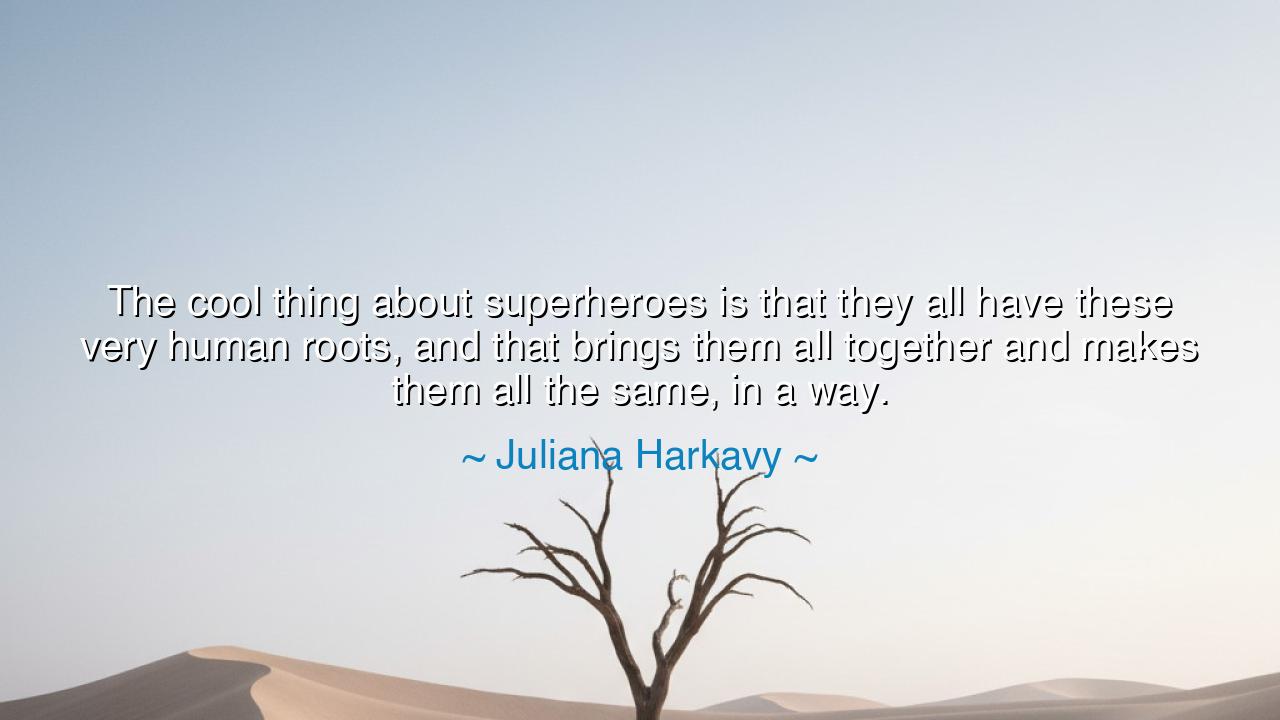
The cool thing about superheroes is that they all have these very
The cool thing about superheroes is that they all have these very human roots, and that brings them all together and makes them all the same, in a way.






The actress Juliana Harkavy, who has herself portrayed heroes in stories of courage and transformation, once said: “The cool thing about superheroes is that they all have these very human roots, and that brings them all together and makes them all the same, in a way.” Though she speaks of modern myths born of comic books and cinema, her words reach back to the very soul of storytelling itself — to the ancient understanding that even the mightiest heroes are reflections of our own humanity. Beneath every mask, beneath every emblem of power, there beats a human heart, flawed and yearning, noble yet uncertain. And in this shared humanity lies their greatest strength.
From the dawn of civilization, people have always woven tales of beings greater than themselves — gods, demigods, warriors, and saviors — yet what endures in these stories is not their divinity, but their struggle. Achilles may have been blessed by the gods, but he was undone by his pride. Hercules had the strength of ten men, yet was haunted by the memory of his mistakes. These ancient figures were the superheroes of their time, and like the heroes of today, they remind us that greatness does not erase humanity; it arises from it. So when Harkavy speaks of human roots, she is not praising imperfection as weakness, but as the fertile soil from which all true heroism grows.
The origin of this truth lies in the dual nature of the hero — the eternal dance between the mortal and the divine. Every superhero, from the tales of old to the screens of today, is a mirror of this paradox. Superman, though born on another world, carries the heart of a humble farmer’s son. Batman, though wrapped in darkness, is driven by the light of justice born from grief. Wonder Woman, though crafted by gods, walks among mortals with compassion as her shield. Their powers set them apart, but their struggles — loss, love, fear, purpose — draw them back to the rest of us. As Harkavy says, it is these shared roots that “make them all the same, in a way,” for every hero’s journey begins with a moment of pain, doubt, or longing — the very emotions that make us human.
Consider the tale of Nelson Mandela, a man not born with supernatural might, but with the quiet fire of conviction. He faced imprisonment, oppression, and despair, yet from those human trials rose a power greater than any weapon — the power of forgiveness. Like the heroes of myth, Mandela’s strength was born not from privilege, but from suffering transformed into compassion. His story, like those of the heroes Harkavy describes, teaches that every person carries within them the potential for greatness, if they have the courage to rise above their pain while never forgetting its lessons.
What Harkavy reveals is a timeless truth: that connection, not power, is the heart of heroism. When we see a superhero fall and rise again, we do not love them for their invincibility — we love them because they remind us of ourselves. We see in their journeys the reflection of our own battles — the unseen wars of fear and faith, loss and renewal. Heroes give form to the invisible struggles that all souls endure. And in this, they bind humanity together across ages and cultures, for the story of the hero is the story of us all.
Yet, there is a deeper teaching hidden within Harkavy’s words — a call to remember that every person has a spark of the heroic within them. The ancients taught that each human carries a daimon, a divine essence that urges them toward purpose and virtue. To live nobly, then, is to heed that inner voice, to confront our flaws and rise despite them. The superheroes of our time are but symbols of this truth — they are reminders that courage, empathy, and perseverance are not extraordinary gifts, but human capacities awakened through choice and sacrifice.
The lesson for us is clear: do not wait for powers from the stars or blessings from gods. The roots of heroism are already within you. When you face hardship with grace, when you act with integrity even when no one sees, when you choose to lift others rather than step over them — in those moments, you join the ancient lineage of heroes that Harkavy honors. The true “cool thing” about heroes, as she says, is that they reveal that every human being, no matter how ordinary, can be extraordinary through compassion and courage.
So remember this teaching, and pass it on: our flaws are not our weakness but our foundation. The divine and the human are not opposites — they are halves of the same whole. Every hero, every legend, every act of bravery begins with a person who dared to care, to believe, to endure. As Juliana Harkavy reminds us, the greatness of the superhero lies not in their flight or their strength, but in their heart — the same heart that beats within us all.






AAdministratorAdministrator
Welcome, honored guests. Please leave a comment, we will respond soon